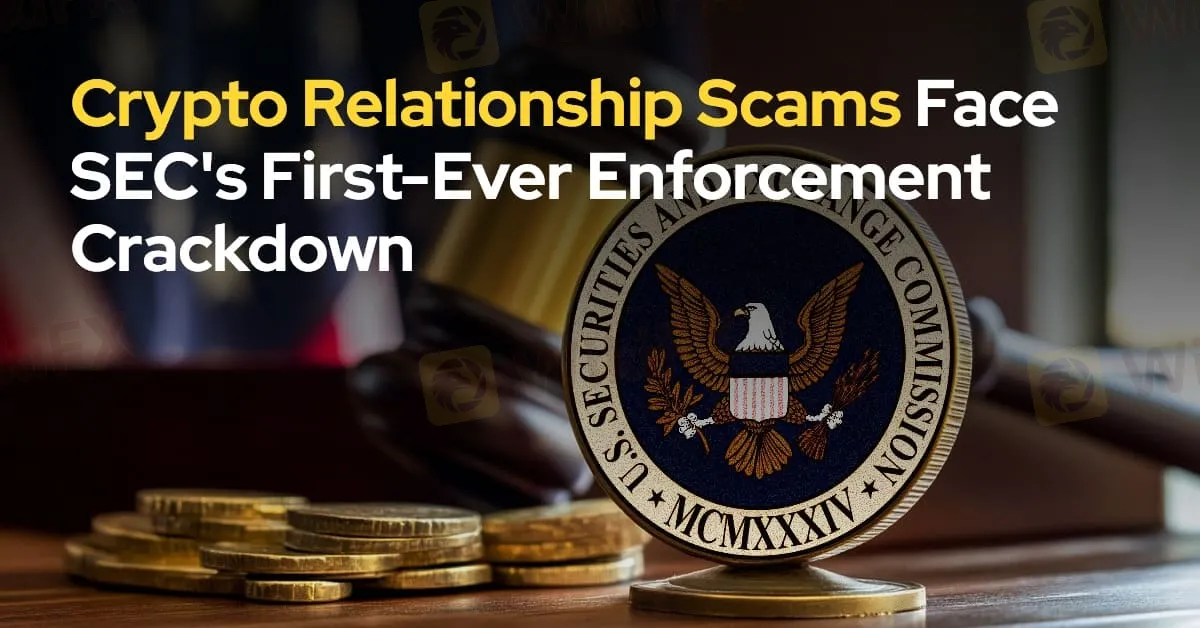简体中文
繁體中文
English
Pусский
日本語
ภาษาไทย
Tiếng Việt
Bahasa Indonesia
Español
हिन्दी
Filippiiniläinen
Français
Deutsch
Português
Türkçe
한국어
العربية
Crypto Relationship Scams Face SEC's First-Ever Enforcement Crackdown
abstrak:The Securities and Exchange Commission (SEC) has initiated its first enforcement actions against crypto-related relationship scams, marking a significant step in combating this growing form of investment fraud.

In a groundbreaking move, the Securities and Exchange Commission (SEC) has initiated its first enforcement actions against crypto-related relationship scams, marking a significant step in combating this growing form of investment fraud. The SEC accused criminals of defrauding millions of dollars from investors through two separate schemes, which operated via social media platforms such as WhatsApp, LinkedIn, and Instagram. The fraudulent schemes were connected to fake cryptocurrency trading platforms NanoBit and CoinW6.
Crypto relationship scams have increasingly become a prevalent type of investment fraud involving popular cryptocurrencies like Bitcoin and Ethereum. These scams typically exploit the anonymity and decentralized nature of cryptocurrency transactions, making it easier for criminals to operate undetected. The speed of irreversible transactions and the ability to move money globally further facilitate these scams, according to the Federal Bureau of Investigation (FBI).
The SECs actions highlight the growing threat posed by such schemes, where criminals establish connections with unsuspecting victims through social media and messaging platforms, gradually building trust before introducing fraudulent investment opportunities. One of the victims, identified only as Jules, shared her experience of being lured into a scam. She described how, after weeks of regular communication with a man she met online, he began to introduce the idea of investing in Bitcoin. Initially hesitant, she eventually took out personal loans to fund her investments. What started with a small amount of around $1,000 quickly escalated into much larger sums.

Jules is not alone in falling victim to these scams. Kim Casci-Palangio, head of the romance scam recovery group at the Cybercrime Support Network, noted that the financial losses tied to these types of fraud can be enormous. Many victims, like Jules, are convinced to invest substantial amounts of money based on the trust they develop with scammers over time.
The SECs enforcement actions against NanoBit and CoinW6 signal a new era of regulatory scrutiny on crypto-related scams. While the decentralized nature of cryptocurrencies has made it difficult to trace fraudulent activities in the past, authorities are now stepping up efforts to hold criminals accountable.
The SECs focus on these types of schemes emphasizes the need for investors to exercise caution when engaging with online platforms, especially when dealing with digital assets. In response to the rising number of scams, experts are urging individuals to verify the legitimacy of any investment opportunities and avoid sharing personal financial information with people they meet online.
As the cryptocurrency industry continues to grow, regulatory bodies like the SEC are intensifying their efforts to protect investors from fraud. The enforcement actions taken in these cases could set a precedent for future crackdowns on crypto-related scams, offering some level of protection to those who may be vulnerable to these schemes.

Disclaimer:
Ang mga pananaw sa artikulong ito ay kumakatawan lamang sa mga personal na pananaw ng may-akda at hindi bumubuo ng payo sa pamumuhunan para sa platform na ito. Ang platform na ito ay hindi ginagarantiyahan ang kawastuhan, pagkakumpleto at pagiging maagap na impormasyon ng artikulo, o mananagot din para sa anumang pagkawala na sanhi ng paggamit o pag-asa ng impormasyon ng artikulo.
Broker ng WikiFX
Exchange Rate


